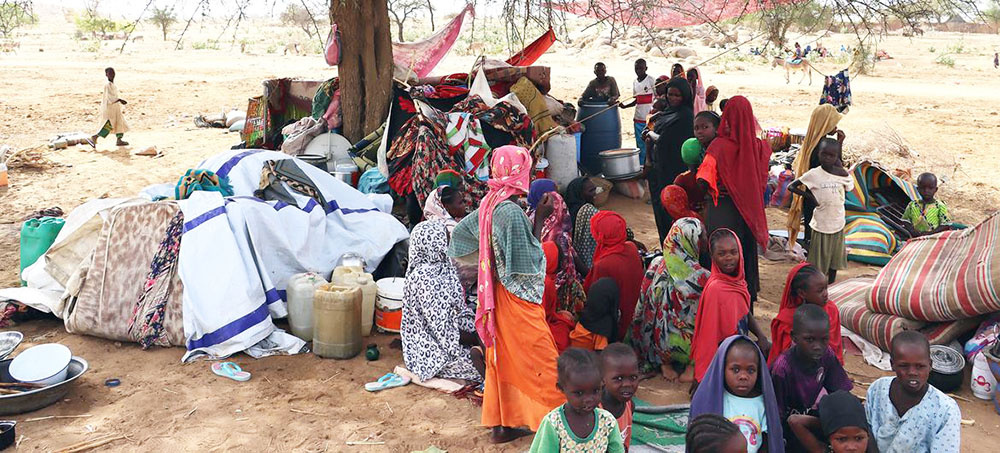
Sudanese Women in ``Kiryandongo`` Camp, Uganda: Severe Violations and Dire Suffering
Report by: Mashair Idris
Sudanese refugee women in "Kiryandongo" camp, northern Uganda, face multiple abuses, including harassment, lack of primary healthcare for pregnant women, and severe food shortages threatening the lives of many refugees in the camp. The lack of employment opportunities to increase refugees income further exacerbates the daily hardships within the camp.
Since the outbreak of war on April 15th, most Sudanese people have either been displaced to safe states or have sought refuge in neighboring countries. The number of Sudanese refugees has reached millions in countries such as Egypt, Chad, Uganda, South Sudan, Kenya, and Rwanda.
Repeated Complaints
Sudanese refugee women report extremely difficult humanitarian conditions in Ugandan refugee camps, alongside repeated sexual assaults. The absence of security and protection that the Ugandan government should provide adds to their suffering. In this context, Maryam Adam (a pseudonym) spoke with bitterness while holding back tears, describing how women endure significant violations due to the lack of safety and protection. She mentioned that repeated assaults occur from time to time by people of different nationalities, including those from Congo, South Sudan, Kenya, and Uganda. She also pointed out the lack of sanitary pads, which are essential monthly needs for Sudanese refugee women, in addition to the absence of primary healthcare services for pregnant women in the camp. She called on the UNHCR and the Ugandan government to provide protection and improve the camp’s environment by ensuring basic life necessities.
Children without Education
The Secretary-General of the Sudanese Refugee Youth Office in "Kiryandongo" camp, Othman Adam Othman, highlighted the lack of sufficient schools for refugee children. Children attend schools in regular clothing due to the lack of uniforms, there is a shortage of textbooks, and a deficit in the number of teachers, all of which increase the challenges faced. Students are required to pay small fees, and Sudanese students experience harassment from students of other nationalities. Additionally, Othman revealed that secondary school students are deprived of education due to the distance to schools and families inability to afford transportation. Sudanese refugee Mona Hussein (a pseudonym) confirmed that Sudanese students are subjected to harassment in schools, leading many families to withdraw their children from education.
Miscarriages Due to Violence
Mona mentioned numerous miscarriages among refugee women due to the lack of primary healthcare. One miscarriage occurred following clashes between Ugandan police and Sudanese refugees in recent weeks, where police violence caused a woman to fall, leading to a miscarriage. She highlighted the significant issue faced by pregnant refugees due to the absence of gynecologists and midwives, in addition to the unavailability of vitamins in hospitals. Doctors also require refugees to purchase medicine despite their inability to afford it.
Numerous Violations and Food Shortages
Othman Adam Othman also acknowledged the major food issue in the camp, where the meals provided are insufficient for a single family. Small committees have been formed to support the establishment of kitchens to provide food for refugees. The demand for these kitchens is high, and currently, there are three kitchens inside the camp serving Sudanese refugees. Plans are in place to add eight more kitchens to meet the food needs. He confirmed incidents of police violence against Sudanese refugees during food distribution, which have become frequent, with Ugandan police resorting to beatings during aid distributions. Additionally, there are thefts by Ugandans targeting refugees.
Implementing the Refugee Convention
Sudanese lawyer Ahmed Abdel Wahab stated that the right to asylum is tied to the 1951 UN Refugee Convention, which defines a refugee as someone who has a well-founded fear of persecution based on religion, ethnicity, gender, membership in certain groups, or political opinions outside their country and cannot return due to these fears. He stressed that signatory countries must adhere to the classifications and treatment methods defined by the convention.
Difference between a Refugee and an Asylum Seeker
Abdel Wahab explained the distinction between a refugee and an asylum seeker. An asylum seeker is someone who has entered a country and applied for asylum, whether legally or illegally. The country has the right to return or deport them, although certain protections apply. However, a refugee is granted basic rights similar to those of citizens in the host country, excluding political rights like voting or running for office.
He noted that international law includes 46 articles in the convention, covering definitions, residence, work rights, and mobility for refugees. However, during the current war, certain conditions have been overlooked. For example, if someone enters a country illegally, they must immediately report to the nearest police station and request asylum. Failure to do so can result in legal consequences. Once a refugee card is obtained, the person is granted all rights and obligations, except for political rights.
Many hope that Sudanese legal defenders will form a human rights coalition to submit a memorandum to the UN regarding the treatment of Sudanese refugees in Uganda, Chad, South Sudan, Egypt, Kenya, and Ethiopia, given the increasing numbers and loss of livelihoods similar to what happened to Syrians previously.

